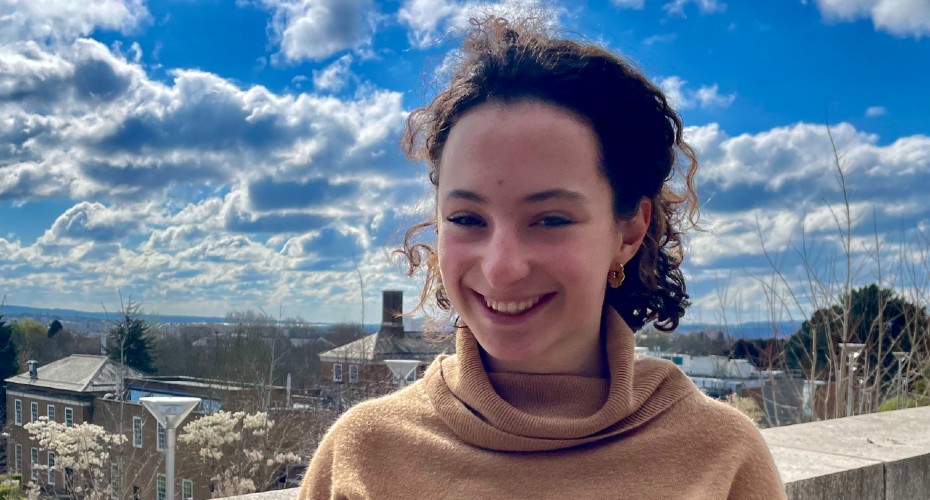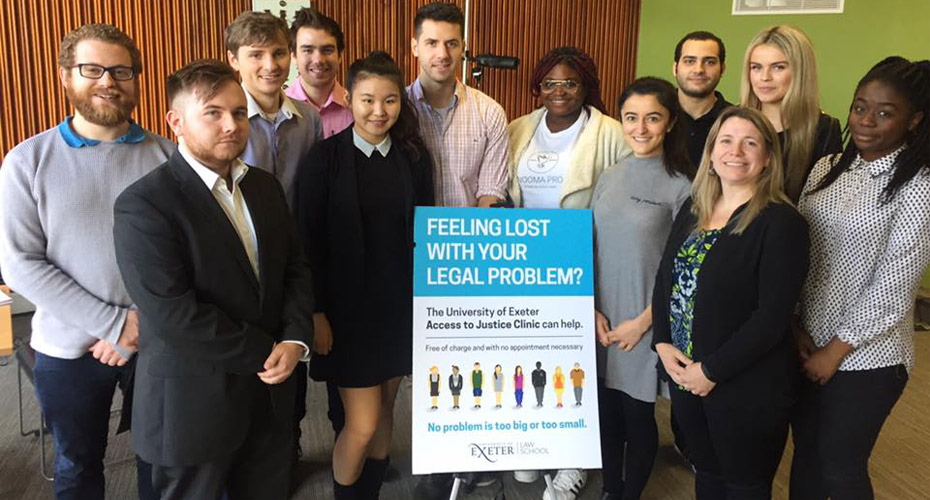Community Partnership Hub - student case studies
Student volunteering

Second-year student Octavia Hamilton (BA History) recently volunteered with local voluntary and community sector service Exeter Connect. Octavia worked with another student to make a short film celebrating Exeter’s voluntary, community and social enterprise sector. You can view their film here.
Octavia had already done some volunteer work with Exeter Student Volunteers and is project leader for the Food Action Project; however, she had no prior filmmaking experience before getting involved in this project.
Octavia’s film showcases a range of Exeter Connect’s activities, bringing multiple projects together and explaining how Exeter Connect has been able to support and develop these.
Hannah Potter at Exeter Connect said:
“Octavia and the others from XTV were fantastic, and we are so grateful for all the work they put into producing the brilliant film celebrating local community activity in Exeter. The film was an engaging way for us to give a glimpse into the variety and diversity of community activity across Exeter. It also really highlighted the passion and hard work of all the community groups featured.
“The film […] will also be such a valuable promotional resource for both Exeter Connect and the groups involved. The project was also a great opportunity for us at Exeter Connect to start building a relationship with a student group.”
Octavia says that working on this project has made her so much more aware of what Exeter offers as a volunteer city. It opened her eyes to different voluntary organisations and projects. And she has gained important skills along the way, teaching herself the basics of filmmaking and editing.
“I met people from all sorts of different backgrounds – all ages, all nationalities. I feel like I now have a much stronger connection with Exeter as a city.”
It has given her a great experience of filmmaking and project managing, which she is now looking to build on by making further films or podcasts related to her volunteer work.
Community engaged learning

Hannah Sheen (year 2, LLB Law) has been working with the University’s Community Law Clinic during her summer holidays. The Community Law Clinic opened its doors in September 2017, in an effort to fill the gaps left by legal aid cuts. The clinic is staffed by Law students, under supervision from qualified legal professionals, and provides a variety of free legal clinics where members of the community can seek advice.
Hannah was involved in the Exeter Immigration Clinic, advising a number of individuals and families on immigration issues. A key breakthrough for her was successfully helping a family of Syrian refugees to gain indefinite right to remain in the UK.
“The most rewarding part for me was making a tangible impact on real people who wouldn’t otherwise have access to legal advice. I got to build a rapport with the clients and saw first hand that my work really made a difference.”
Hannah also points out that studying law is quite different from putting it into practice in a working environment, and that the Community Law Clinic has given her a chance to build up skills and experiences that will be crucial in her future legal career. She will be working with the Community Law Clinic again in the summer of 2022, this time in the Access to Justice Advice Clinic.
Student placement

Cameron Tooke is studying for an MA in Food Studies and has been completing a placement for his Directed Practical Study module with Good Food Exeter, a not-for-profit social enterprise that promotes local, healthy and sustainable food.
Cameron was interested in sustainable food and wanted to participate in a project that had a tangible local impact. His work for Good Food Exeter has included conducting research for their newsletter and social media channels: for instance, he looked at what ‘plant-based’ means and at how people can cut down their meat consumption. He also produced an article on the sustainability implications of buying imported, out-of-season roses for Valentine’s Day. This research was informed by his university studies, and the placement in turn allowed him to put some of his knowledge into practice. Cameron said:
“Sustainability and shorter food chains were an element covered in my course, but this placement allowed me to look at these topics in much more detail. It has been a really useful insight into the theory around how to produce sustainable food and how to put all of that into practice in a business setting.”
Sonia Ryan of Good Food Exeter emphasised what a great addition Cameron was to the team.
“During his time with us [Cameron] has demonstrated and implemented all the skills needed to work here including responsibility, initiative, trustworthiness and organisation. Customers […] have said how friendly and professional he has been (something I most certainly agree with) and it has been great being able to assign him roles and tasks, allowing for me to prioritise my own work.”
If your organisation is interested in offering a placement, please look at our placement webpages.
Student internship
As part of the Erasmus+ funded Communities and Students Together project, academics and students from the University worked with Exeter’s oldest building, St Nicholas Priory, and other attractions such as Tucker’s Hall and the Royal Albert Memorial Museum, to produce a brand new geo-located walking tour for the Hidden Exeter app. This partnership offered an innovative skills-based learning opportunity for students who worked as interns on the project, while creating a valuable new resource that brings Exeter’s urban heritage to life and engages new audiences.
Former student Megan Woolley undertook an internship on this project while working towards her MA in Classics and Ancient History. For her, contributing to the Hidden Exeter app was a great opportunity to build skills in historical and place-based research, and in communicating with different audiences outside of academia. She researched information about the sites on the walking tour, found interesting objects and images that could be used, and connected these to the story that’s told on the walk itself. Megan has now gone on to work in a heritage organisation, and says she would certainly recommend a similar internship to other students:
“Even if you don’t think that heritage is where you want to go in career terms, doing the research and learning relevant skills is great. An internship means applying your knowledge in a practical way. For me, bringing history to life through the app was a really interesting experience.”
For Judith Morgane, manager at St Nicholas Priory, the Hidden Exeter project was an invaluable chance to work with the University. She said:
“To have an app like Hidden Exeter for people to explore Exeter’s history is a new and invaluable tool to reach new audiences. Making our heritage buildings, and indeed our past, relevant to an audience used to experiencing life with and through smartphones, is an important step in strengthening and building diverse, resilient communities. For us at St Nicholas Priory, working with the academic community and the student interns gave us the chance to explore our building’s history in a completely new way.”
The Hidden Exeter app is available for free from the Apple Store and Google Play.